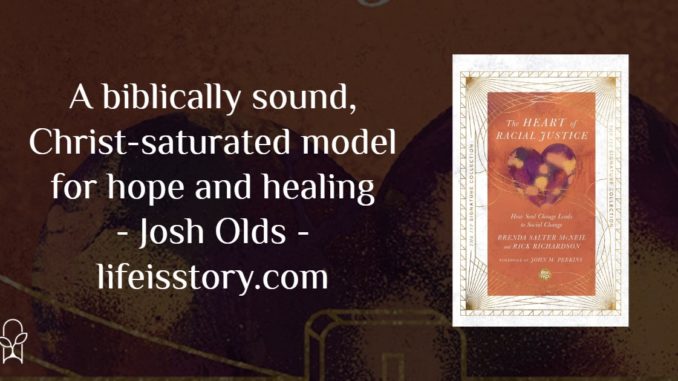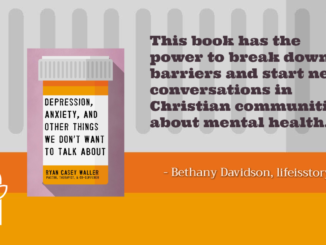
Also by this author: The Heart of Racial Justice Bible Study, Empowered to Repair: Becoming People Who Mend Broken Systems and Heal Our Communities
Published by IVP on January 11, 2022
Genres: Non-Fiction, Christian Life, Racial Reconciliation
Buy on Amazon
Goodreads

Racial and ethnic hostility is one of the most pervasive problems the church faces. It hinders our effectiveness as one body of believers. It damages our witness. Why won't this problem just go away? Because it is a spiritual battle. In response, we must employ spiritual weapons--prayer, repentance, forgiveness. In this book Brenda Salter McNeil and Rick Richardson provide a model of racial reconciliation, social justice, and spiritual healing that creates both individual and communal transformation. Read this book if you want to learn how to
use your faith as a force for change, not as a smoke screen for self-protection embrace your true self and renounce false racial identities receive and extend forgiveness as an act of racial reconciliation experience personal transformation through the healing of painful racial memories engage in social action by developing ongoing crosscultural partnerships This classic is now part of the IVP Signature Collection, which features special editions of iconic books in celebration of the seventy-fifth anniversary of InterVarsity Press. It includes a list of definitions and a discussion and activity guide for groups. A new companion Bible study is also available.
Soul change leads to social change. That sentence is the driving factor of The Heart of Racial Justice. Cowritten by Brenda Salter McNeil and Rick Richardson, this now-classic book provides a model of racial reconciliation and social justice that is completely driven by the Holy Sprit.
Rick and Brenda speak openly of the challenges in developing strong interracial friendships, using their own lives as examples. Specifically, they recount how, in the middle of going through a tough time in a reconciliation ministry, Rick had hired Brenda to be part of his team. With tensions at home and work, facing the most serious professional and personal crisis of his life, Rick stepped down from his position. Brenda, unaware of this context, entered into a now even more unstable situation, feeling abandoned by another white man who talked a good game but gave up when things got hard. But reconciliation came (several years later!) through conversation, and through a shared Holy Spirit and a willingness to forgive, lament, heal, and come back together.
That experience, to me, was symbolic of The Heart of Racial Justice. Richardson and McNeil were willing to heal together and it’s this healing model of reconciliation they set forth:
- Reconciliation is above all the work of God and happens best in the presence and power of God.
- Reconciliation with others is based on having a healthy sense of one’s own identity.
- Reconciliation is above all rooted in the work of Christ on the cross.
- As we experience forgiveness and the possibility of a new future together, we will realize that there have been larger, destructive forces at work in our common life.
- We must individually and corporately embrace being a new creation.
Integral to this model, and most eye-opening for me personally, was the chapter on understanding the principalities and powers—the demonic influences—behind personal and systemic racism. Too often, discussion of “demonic influences” are sensationalized and hyperbolized to the point they just seem silly. The Heart of Racial Justice takes it seriously, soberly and cogently laying out a case that the underlying root of this type of evil is spiritual.
It’s this element that is the most distinctively Christian. Not to say that the rest isn’t, but rather that it is this one aspect that I’ve found most powerful in getting evangelical believers to understand systemic racism. It grounds racial reconciliation and social justice as a spiritual battle and sets it apart from the secular attempts at reconciliation and justice we’ve seen popularized today.
Originally published in 2004 (and expanded in 2009), IVP is republishing The Heart of Racial Justice as part of their Signature Collection, a group of books repackaged to celebrate the seventy-fifth anniversary of InterVarsity Press. It’s a worthy addition to the collection and will hopefully enable a new generation to grasp hold of the much-need and still-timely content. This is one of those books where you would hope that the content would no longer be relevant. Instead, we find it timelier than ever. As the evangelical church largely reacts negatively to modern secular reconciliation and social justice movements, Brenda Salter McNeil and Rick Richardson offer a biblically sound, Christ-saturated model for hope and healing.



